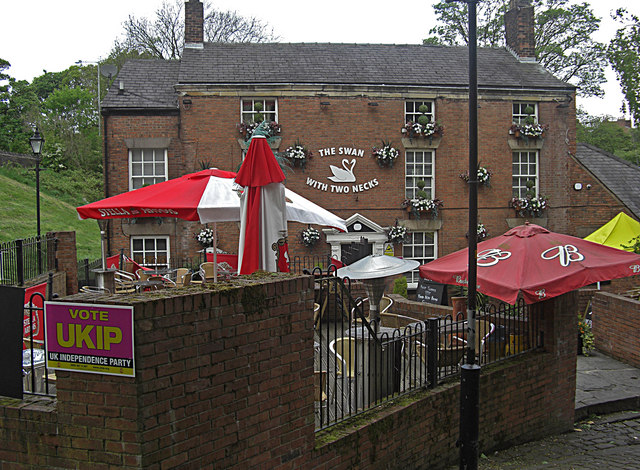The Rochester by-election highlights a pervasive ‘anti-politics’ mood in the UK

credit: Michael Ely, CC BY 2.0
Britain 2014: The richest 1% of the UK population owns as much wealth as the poorest 55%, and the country has been in the throes of its longest period of economic stress since the 1930s. Under these circumstances it is hardly surprising that many voters are angry and searching for someone to blame.
The politics of blame were certainly present on the streets of Rochester and Strood, where UKIP’s Mark Reckless won a by-election triggered by his earlier defection from the Conservatives. Coming hot on the heels of UKIP’s win in Clacton, the result was deeply unsettling for mainstream politicians accustomed to two-and-a-half party politics. But while the results of both by-elections had their particular causes, they also serve to highlight a number of broader challenges facing contemporary British democracy.
As psychologists know well, anger is an emotion that leads people to make sweeping generalisations and to engage in stereotyping (see here and here, for example). It is not unexpected, therefore, that so many of those who see themselves losing out in the current economic climate blame ethnic ‘others’. As in the 1930s, ethnic out-groups represent convenient targets, especially as competition with these groups for jobs and services is seen by sections of the indigenous population as the immediate cause of the economic strains they are experiencing. Seen through this lens, UKIP’s offer may appear at least marginally more attractive than the other political products around at the moment.
But ‘ethnic’ others are not the only group that many voters seem to be blaming. Many are also looking to Westminster and venting their dissatisfaction with what they perceive to be a distant, unresponsive and dishonest political class. Large sections of traditional Conservative, Labour and Liberal Democratic voters are unhappy with their respective parties.
In one sense, the anger underpinning UKIP support is a product of the particular performance of the governing and opposition parties’ in the current economic climate. The Conservatives and their Liberal Democrat partners have pressed ahead with austerity policies with apparent disregard for rising levels of inequality. For many people, the Conservatives’ promise to govern in the spirit of being ‘in it together’ is a cruel joke. The party seems constitutionally unable to recognise that while many of their leaders and all of their major backers hail from the richest 1%, very few voters among their traditional support base fall into this category. And, of course, the fact that the Liberal Democrats, who have traditionally benefited from protest votes, are in government means that they are no longer a suitable object for the expression of outrage at the powers-that-be.
Meanwhile, Labour, which should be making hay in the current economic climate, has still to regain its credibility after 13 years in power. It is also failing to reach out to its own natural support base. The party’s leadership is manifestly not drawn from the ranks of working-class voters, as shown by Emily Thornberry’s crass tweet during a visit to Rochester, and it is unsure how to reconcile its commitment to all workers with its traditional commitment to indigenous white-collar workers. Thus it has failed to explain to voters the underlying structural causes of the economic problems they face, and to show them how their experience of ‘losing out’ to migrant workers is in fact the consequence of the prevailing economic system.
Populism has historically taken two main forms: the populism of the right-wing xenophobe and the populism of the left-wing anti-plutocrat. That the populist anger currently manifesting itself in Britain is of the first rather than the second type is testimony to Labour’s failure to communicate effectively with its natural support base.
In another sense, however, the anger underpinning UKIP support is also a product of perceived failings with mainstream politics more generally. There is a lingering ‘anti-politics’ mood, exacerbated by the 2009 MPs’ expenses scandal, that won’t seem to go away. Ever since the Telegraph revealed details of how some MPs were using the public purse to clean their moats and damp-proof their third homes, journalists have continued to regale us with their financial misdemeanours. The revelation in early November that the House of Commons had been systematically destroying potentially incriminating documents relating to the parliamentary expenses regime is merely another signal that MPs from all parties still do not understand the depth of the public’s anger at their abuse of privilege.
Politicians certainly need to be more mindful of their perceived conduct. Our own research shows that people who were more sceptical about the integrity of politicians prior to the 2010 General Election were more likely to vote for minor parties, such as UKIP. Constituents’ evaluations of their own MPs’ honesty were also associated with electoral support for one of the smaller political parties. For it was not just UKIP that came out shining last week in Kent; the Greens also saw their votes share nearly triple from 1.5% in 2010 to 4.2%.
Politicians also need to be more mindful of their verbal honesty. Many voters think politicians are not straight with them and knowingly make empty promises. In this respect, UKIP is fortunate that the issues it presently ‘owns’—immigration and the European Union—serve to highlight the apparent verbal dishonesty of mainstream politics. Politicians have to reconcile the realities of governing with the demands of campaigning. Tough talk on immigration or anti-EU rhetoric is largely at odds with the policy options available. Britain is part of a globalised economy and needs migrant workers. Britain is also part of the European Union, with all that entails. Any party that decided to raise the drawbridge from the world economy and withdraw from the EU would be going down an extraordinarily courageous if not catastrophic path. Responsible politicians would do well to recognise that they cannot, at least at the current time, chase the UKIP vote in respect of both the EU and immigration.
The voters who took part in the Rochester and Strood by-election were the ones who cared; it should not be forgotten that half the electorate stayed at home (including, it appears, the famous white van man of Emily Thornberry’s tweet). Those committed enough to take part in the poll should not necessarily be seen as reacting against democratic politics, however; they are perhaps more accurately described as reacting against the insidious politics of ‘us’ and ‘them’ that has crept into Westminster.
UKIP has been cultivating this ‘us’ and ‘them’ vote for some time. One of their posters in 2010 had photographs of the three party leaders beneath three words: ‘Sod the lot’. Such a message may serve them well in 2015.
—
Nicholas Allen and Sarah Birch’s book Ethics and Integrity in British Politics: How Citizen Judge their Politicians’ Conduct and Why it Matters will be published by Cambridge University Press in February 2015.
Note: This article originally appeared on the LSE British Politics and Policy blog. It gives the views of the authors, and not the position of Democratic Audit UK, nor of the London School of Economics. Please read our comments policy before posting.
—
 Nicholas Allen is Senior Lecturer in the Department of Politics and International Relations at Royal Holloway University.
Nicholas Allen is Senior Lecturer in the Department of Politics and International Relations at Royal Holloway University.
 Sarah Birch is Professor of Comparative Politics at Glasgow University and a Fellow of the British Academy. She specialises in the study of ethics and misconduct. Her current research has two main foci: attitudes toward public ethics and electoral integrity.
Sarah Birch is Professor of Comparative Politics at Glasgow University and a Fellow of the British Academy. She specialises in the study of ethics and misconduct. Her current research has two main foci: attitudes toward public ethics and electoral integrity.





 Democratic Audit's core funding is provided by the Joseph Rowntree Charitable Trust. Additional funding is provided by the London School of Economics.
Democratic Audit's core funding is provided by the Joseph Rowntree Charitable Trust. Additional funding is provided by the London School of Economics.
RT @democraticaudit The Rochester by-election highlights a pervasive ‘anti-politics’ mood in the UK https://t.co/z6vJS3lTyv #LG116
You say that politicians need to be more mindful of their verbal honesty. How can politicians of the main parties be? To do so would be to admit that they, those elected to run affairs on our behalf, have handed control over policy in large swathes of public life to the unelected institutions of the EU. “Sorry but there is nothing we can do and we want it that way” is the honest response. Instead they use weasel words and mealy mouthed platitudes to conceal the facts. The europhile writer and journalist, the late Hugo Young, had it totally right when he suggested that the failure of the elite to be honest about what the EU actually entailed would store up problems for the future. That future is now. And curiously, the Greens too are likely to become more eurosceptic again (as they were 25 years ago) when the realities begin to dawn that key areas of what they might like to achieve are prevented by membership of the EU.
The Rochester by-election highlights a pervasive ‘anti-politics’ mood in the UK https://t.co/3kqAv9zspL
The Rochester by-election highlights a pervasive ‘anti-politics’ mood …. but maybe not Scotland? https://t.co/fdmvh2J8sx